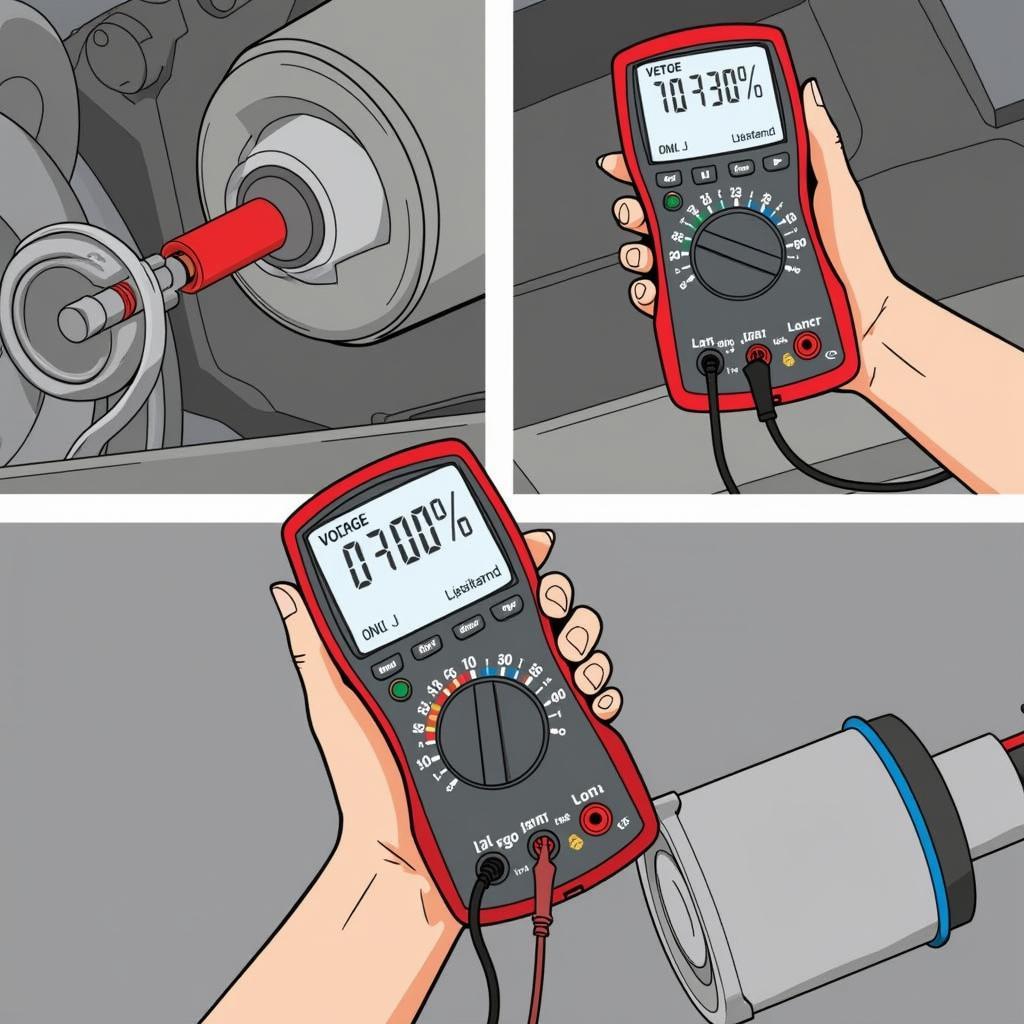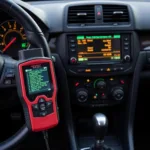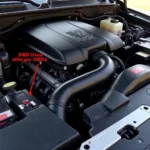The OBD2 code P0332 signals a problem with your vehicle’s crankshaft position (CKP) sensor circuit. This code specifically indicates low input to the engine control module (ECM), suggesting an issue with the signal generated by the sensor. But what does that mean, and how does it impact your vehicle?
This comprehensive guide delves deep into the P0332 code, exploring its causes, symptoms, diagnostic procedures, and potential solutions.
Deciphering the P0332 Code: What Does it Mean?
The crankshaft position sensor is a vital component of your car’s engine management system. It monitors the crankshaft’s rotational speed and position, sending this crucial data to the ECM. The ECM relies on this information to regulate critical engine functions like:
- Fuel injection timing: Determining the precise moment to inject fuel into the cylinders.
- Ignition timing: Controlling the spark plug firing sequence for optimal combustion.
When the ECM detects an inconsistent or weak signal from the CKP sensor, it logs the P0332 code, indicating a potential problem with the sensor circuit.
Why is the P0332 Code Important?
A malfunctioning crankshaft position sensor can significantly impact your vehicle’s performance and drivability. Ignoring the P0332 code can lead to:
- Engine starting problems: Difficulty starting the engine, requiring multiple attempts.
- Rough idling: The engine may vibrate excessively or stall when idling.
- Reduced engine performance: Loss of power, hesitation during acceleration, or poor fuel economy.
- Increased emissions: Higher levels of harmful exhaust gases released into the environment.
- Transmission issues: Shifting problems, harsh gear changes, or transmission slipping.
In severe cases, a complete engine stall while driving is possible, posing a serious safety hazard.
What Causes the OBD2 Code P0332?
Several factors can contribute to a P0332 code. Here are some of the most common culprits:
- Faulty Crankshaft Position Sensor: The sensor itself may be damaged, worn out, or misaligned, leading to inaccurate readings.
- Wiring Problems: Damaged, corroded, or loose wiring in the sensor circuit can disrupt signal transmission.
- Damaged Connector: The sensor’s electrical connector may be broken, corroded, or improperly connected.
- Faulty Reluctor Tone Ring: The reluctor ring, a toothed wheel attached to the crankshaft, can become damaged or misaligned, interfering with sensor readings.
- ECM Issues: In rare cases, a faulty ECM may misinterpret sensor signals, triggering the P0332 code.
Diagnosing the P0332 Code: A Step-by-Step Guide
Diagnosing the underlying cause of the P0332 code requires a systematic approach. Here’s a general guide:
-
Read and Clear the Code: Use an OBD2 scanner to retrieve and clear the stored codes. This step helps confirm the P0332 code and ensures it’s not a sporadic error.
-
Visually Inspect the CKP Sensor and Wiring: Check the sensor for any visible damage, such as cracks, corrosion, or loose connections. Inspect the wiring harness for frayed wires, burns, or signs of damage.
-
Test the Sensor’s Voltage and Resistance: Use a multimeter to measure the sensor’s voltage and resistance. Compare the readings with the manufacturer’s specifications to determine if the sensor is operating within the acceptable range.
 Testing Crankshaft Position Sensor
Testing Crankshaft Position Sensor
-
Inspect the Reluctor Tone Ring: Examine the reluctor ring for any damage, missing teeth, or misalignment. Ensure it’s securely attached to the crankshaft.
-
Check the ECM: If all other components check out, the ECM might be the culprit. However, testing the ECM requires specialized equipment and expertise, so consult a qualified mechanic for this step.
How to Fix the OBD2 Code P0332
Once you’ve pinpointed the root cause of the P0332 code, the solution typically involves replacing or repairing the faulty component.
- Replace the Crankshaft Position Sensor: If the sensor is defective, replacement is the most effective solution.
- Repair Wiring Issues: Damaged or corroded wiring should be repaired or replaced to restore proper signal transmission.
- Replace the Connector: A faulty connector needs replacement to ensure a secure electrical connection.
- Address Reluctor Tone Ring Problems: Repair or replace a damaged or misaligned reluctor ring.
- Consult a Mechanic for ECM Issues: ECM repairs or replacements require specialized knowledge and equipment.
Preventing Future P0332 Codes
While some causes, like sensor wear and tear, are unavoidable, proactive maintenance can significantly reduce the likelihood of encountering the P0332 code again.
- Regular Inspections: Regularly inspect the CKP sensor and its wiring for any signs of damage or corrosion.
- Timely Replacements: Consider replacing the sensor at recommended intervals or if you notice any performance issues.
- Quality Parts: Always use high-quality replacement parts from reputable brands to ensure optimal performance and longevity.
- Professional Assistance: If you’re unsure about any aspect of diagnosis or repair, consult a qualified mechanic to prevent further damage or complications.
OBD2 Code P0332: Frequently Asked Questions
Q: Can I still drive my car with the P0332 code?
A: While driving with the P0332 code might be possible for a short distance, it’s highly discouraged. Driving with a faulty CKP sensor can lead to further engine damage, reduced fuel efficiency, and safety risks.
Q: How much does it cost to fix the P0332 code?
A: The repair cost varies depending on the underlying cause and labor rates. A simple sensor replacement might cost between $100 to $300, while more complex issues like wiring repairs or ECM replacements can range from $500 to over $1000.
Q: Can a bad battery cause a P0332 code?
A: While a weak battery can sometimes trigger sensor-related issues, it’s unlikely to be the direct cause of the P0332 code. However, it’s essential to ensure your battery is in good condition for overall vehicle health.
Seeking Further Assistance
Navigating the complexities of OBD2 codes can be challenging. If you need further assistance with diagnosing or resolving the P0332 code or have any other car-related queries, don’t hesitate to reach out to our team of experts. Contact us via WhatsApp at +1(641)206-8880 or email us at [email protected]. We’re available 24/7 to provide expert guidance and support.

